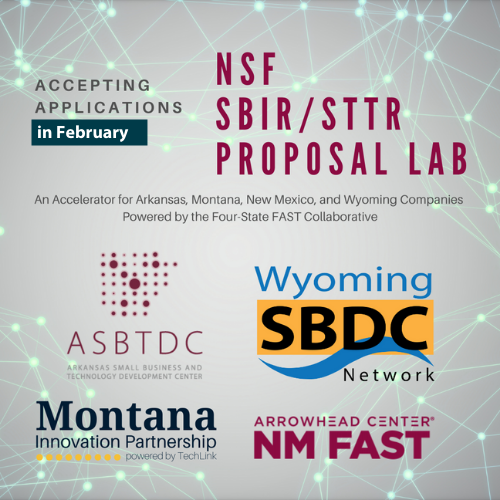Arkansas is part of the new Four-State FAST Collaborative formed to help small companies compete for National Science Foundation seed funding for innovative technologies.
In the effort, the Arkansas Small Business and Technology Development Center joins three other recipients of Federal and State Technology Partnership Program grants:
- Montana Innovation Partnership powered by Montana State University TechLink Center
- Arrowhead Center’s NM FAST at New Mexico State University
- Wyoming Small Business Development Center at the University of Wyoming

Together, the partners are offering the SBIR/STTR Proposal Lab – NSF, a four-week virtual accelerator, starting March 29.
The Proposal Lab will teach companies from the four states how to prepare winning proposals for NSF’s Small Business Innovation Research/Small Business Technology Transfer program. The timing of the accelerator precedes the agency’s June application deadline.
“Early-stage and established Arkansas companies with ideas for products and services that are new to the market and align with one or more of NSF’s technology topic areas are encouraged to apply for the Proposal Lab,” said ASBTDC’s Innovation Specialist Rebecca Todd. For topic examples, see this list of technologies.
Participation in the accelerator is free, but spots are limited. Applications will open in February.
With NSF, Project Pitch Comes First
The NSF requires its SBIR/STTR applicants to have an approved Project Pitch prior to submitting a proposal.
Todd said companies interested in the Proposal Lab should participate in the Feb. 10 Project Pitch Workshop to get acquainted with NSF requirements. Register for the free webinar at tinyurl.com/e235w4vt.
Through its SBIR/STTR program, NSF awards $200 million each year in research-and-development funding to small business startups. “Small businesses funded by our program have since gone on to tremendous success, changing industries, and helping people and the planet,” states the program’s website, seedfund.nsf.gov.
NSF is one of 11 federal agencies that participate in SBIR and one of five STTR agencies. Considered America’s Seed Fund, SBIR/STTR provides $4 billion in grants and contracts to small companies annually.
Virtual Format Increases Access to SBIR/STTR Resources
ASBTDC State Director Laura Fine expects the four-state partnership to build on the success of the center’s Lab2Launch SBIR/STTR accelerator program. “The last two years, we’ve had a great response to the virtual Lab2Launch format. The companies learn a great deal from each other, so having the chance to engage with participants and leaders from other states will enrich the experience even more,” she said.
With funding from the U.S. Small Business Administration, the members of the Four-State FAST Collaborative all support small businesses developing advanced technologies and seek to improve SBIR/STTR outcomes for small businesses. For more information, contact Todd at rctodd@ualr.edu or (501) 916-6721.